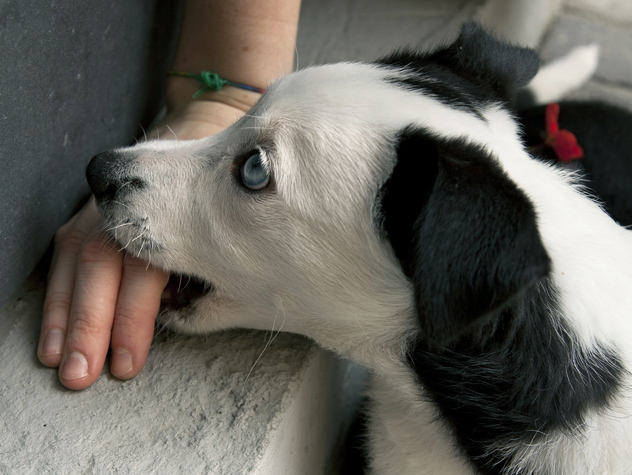
You may notice your dog barking at dogs. This is likely to be socially facilitated barking or conflicting emotions. In this article, we'll look at Socially Facilitated Barking (SFB), and discuss some potential causes and remedies. You may learn something. Don't be afraid, however, to seek professional assistance if your dog's barking causes you grief.
Canine senility
If your dog is constantly barking, it could be the result of a condition called canine senility. Canine senility is similar to Alzheimer's disease in humans. Cognitive changes can occur in older dogs. This includes difficulty recognizing people and identifying the right place to eliminate them. Excessive barking can result from confusion about where and when to eliminate your pet.
Dementia in dogs is a progressive disease, which has no cure. This condition can cause dogs to live up to 14 years. However there are treatment options that can help prolong their lives. Discuss with your vet the prognosis of your dog and the treatment options you prefer. You can consult a veterinarian if your dog shows signs of dementia.
There are simple options for older dogs. One of the easiest ways to treat your dog's barking problem is to apply a dog-appeasing pheromone collar. The collars can be purchased at pet shops and last for approximately a month. Another easy intervention is a change in diet. The diet of older dogs is different than that of younger ones. It should contain more Omega-3. Be sure to add a little bit of Omega-3 to your dog's diet at a time, as too much of either will result in diarrhea.
The early stages of canine dementia are not easy to recognize, but there are definite signs. Early signs include your dog barking at unfamiliar objects and wandering around the house. It may also lose its sense of direction, become confused, or start to walk up to furniture. Your dog might eventually become totally disabled and be unable to lead a normal lifestyle.
Conflicting emotions among dogs
Dogs often understand the emotional meaning of human vocalizations. Dogs can match the sounds we make with human facial expressions. Additionally, dogs are able to process human emotions vocalizations in an asymmetrical fashion. For instance, they process human facial expressions as indicating either excitement or distress. They will often move away from a threat or challenge rather than approach it.

I always pay attention to the body language and expressions of my dog when he is approached by another dog. He may be trying to flee or stay. He may be experiencing internal conflict by his body postures. His body language may also reflect this behavior, such as his tucked tail between his legs. He may also be exhibiting a distinctive snarl. If other dogs start barking at my dog it's likely that he is experiencing inner conflict.
A common cause of conflicting emotions in other dogs is a lack of social cohesion. Dogs may mimic the feelings of people and dogs. These problems can be alleviated by increasing the social cohesion between dog-human dyads. Emotional contagion can also lead to increased stress in dogs and humans.
Socially Facilitated Barking
Barking is a natural response when your dog sees a dog or hears a bark from another dog. Your dog may be greeting another dog with a bark of greeting, but this is usually harmless. If your dog barks incessantly when you hear another dog bark, it could be socially facilitated barking. Here are some tips to decrease your dog's excessive barking.
If you hear another dog barking at your dog do you stop it? Most dogs instinctively bark to communicate with other dogs. This instinct could be due to their wolf-like ancestry. But there's an exception. However, there is an exception. Dogs may bark at their neighbor dogs for various reasons.
Barking caused by frustration is another cause of socially-facilitated barking. Dogs bark when they consider humans or other dogs to be a threat. This barking usually has a trigger that makes it sound like another dog is trying to attack them. If the dog senses an intruder, this is another type of barking. This can also be caused by injury or illness.
Dogs are more likely to engage in social activities repeatedly when they do. These dogs could receive secondary reinforcements like food or sex. It is possible that your dog is being socially facilitated by barking at other dogs. A variety of experiences may also explain this behavior. In some instances, social facilitation may be the cause of a dog's aggressive behavior.
Barking from dogs suffering from canine senility is a sign of excessive sensitivity
Incontinence is a common symptom in canine senility. As with humans, dogs age differently in how they interact with their environment and their behavior. It is possible for their major organs and joints to fail and they might become more worried about the environment. For more information, contact your veterinarian. These are common symptoms of canine dementia and the treatments that can be used to treat them.
Dogs suffering from dementia might experience changes in their behavior and memory. It's also known as dog cognitive dysfunction. The symptoms can vary between breeds and individuals, but proper treatment can help a dog remain healthy and happy. In addition, there are dietary changes that can help your dog with this condition. Listed below are some symptoms of canine senility and what to look for.

An underlying medical condition may cause excessive vocalization. The excessive barking can be a sign that you are suffering from pain, illness, or cognitive dysfunction syndrome. It could also be an indication of aging, or a symptom for a larger health issue. Additionally, excessive barking can be a sign or symptom of a medical condition like separation anxiety, a degenerative illness, or a behaviour disorder.
Canine senility can also manifest in the same way as Alzheimer's Disease in humans. Canine senility in dogs can cause confusion, irritability, and even lead to the dog losing his or her sense of direction. Similar behavior can be seen in dogs who bark when they don't want to hear anything. This behavior can be a sign that your dog is getting older.
Canine senility results in excessive night barking
Canine senility may also explain why your pet is barking all night. This is due to a slow decline or Alzheimer-like disease in cognitive function. Dogs may become less able to concentrate, lose their ability to learn new tasks, and experience a decline in their enjoyment of playing. There is no cure for this condition. There are simple, affordable ways to reduce your dog's nighttime barking.
Your veterinarian should be consulted if you believe your dog is suffering from night barking. Vitamins or antioxidants can be used to treat some of these conditions. You may be referred to an animal behaviorist by your veterinarian. This will help you stop your dog's barking throughout the night. You can purchase toys for your dog to entertain him and take him out on walks regularly to alleviate boredom. In addition, you can try purchasing natural wildlife repellents. You might also want to consider motion detector lights for your home if your dog barks at night.
Canine senility is often difficult to spot and can be mistaken for normal aging. Be vigilant and be on the lookout for changes in your dog. You can identify any deviations in your dog's routine by getting to know him. A Tractive GPS tracking device is an option if your dog wanders a lot. These devices track your dog's activity and sleep patterns and compare them with other dogs of the same breed. The device can be especially helpful if your pet is lost or needs assistance.
FAQ
What are the signs that my dog could be sick?
Many symptoms can indicate that your dog may be sick. Some symptoms are:
-
Vomiting
-
Diarrhea
-
Lethargy
-
Fever
-
Weight loss
-
A decreased appetite
-
Coughing
-
Difficulty breathing
-
Bleeding from your nose
-
Urine or stool contaminated with blood
These are just a handful of examples. Your vet will know what to look out for.
How to make your pet happy
Pet owners often wonder about how to make their pets happy. Pet owners often buy toys, treats, or clothes for their pets. It might not work as pets may not like certain things. For example, some dogs cannot stand to wear sweaters.
Try to understand why your pet doesn't love it before you buy it. It is possible that your pet prefers different foods to you. He might even hate shoes.
You can also play games with your pet. You can also use a ball and a frisbee. You can also throw it around in the room. You can also just throw it in the air, and watch it chase down. This game is fun for both of you. It's both relaxing and enjoyable.
You can also give your pet a bath every other week. A bath helps to remove dead skin cells and dirt from your pet's coat. He will also enjoy a nice smelling bath.
It is also vital that your pet stays healthy. Do not allow your pet to eat junk food. You should instead feed him quality food. He should get plenty of exercise, too. Take him for a walk, or play fetch.
Your pet will appreciate spending time with the owner. Many pets will prefer to spend time with their owners, rather than being left alone.
Last but not least, be sure to unconditionally love your pet. Never yell at, hit or scold your pet. Be patient with him. Keep him company.
Should I get a kitten or a puppy?
It all depends on who you really are. Some people love kittens, while others prefer puppies.
However, puppies tend be more active and playful. Kittens sleep a lot, and they are very gentle.
Both types of animals need lots of attention from their parents. They will get older quickly and need to be taken care of.
Regular medical checks will be required for them. Also, they will require regular medical checkups so you'll have to spend time taking them to see the vet.
What are the things you should consider when buying a pet?
Consider what lifestyle you want for your family and yourself. Do you have any children? Do you have children? How old are they now Are there any special dietary requirements for them?
Are you allergic to anything? Are there any other things you should know about your pet's health?
Now, you can think about whether you are looking to find an active companion, quiet lap dog or house-trained cat. Or perhaps a fish tank filled with tropical fish.
Adopting a puppy is a great idea. Make sure to visit a rescue or shelter group so you can get to know the animals and feel at ease with them.
You should also verify that the animal has been vaccinated to prevent rabies, and other diseases.
Finally, ask the owner if he or she will take care of the animal while you go on vacation. This way, you won't have to worry about leaving your pet at home alone.
Remember that pets are part your family. If you don't like them, you shouldn’t adopt them.
There are three things you should consider before buying a cat.
Before buying a cat, make sure you have considered these questions:
-
Does the cat have any health issues?
-
Will my cat eat all the food I have prepared?
-
Is it because I am a lover of cats or do you just want a pet to play with?
What are some things to consider before purchasing an exotic pet
Before you purchase an exotic pet, you should think about these things. The first thing you need to do is decide whether you want to keep the animal as a pet or if you want to sell it for money. If you intend to keep the animal as a pet then ensure you have enough space. Also, you need to determine how much time and effort it will take. It is not easy to care for an animal. However, they provide great companionship.
If you are looking to sell your animal, you will need to find someone willing to buy it. You should ensure that the person who buys your animal is knowledgeable about how to care for animals. Don't give your animal too much food. This could cause health problems later on.
If you choose to get an exotic pet, then you need to make sure that you research all aspects of them. Many websites can provide information on various species of pets. Be cautious not to fall for scams.
Statistics
- * Monthly costs are for a 1-year-old female mixed-breed dog and a male domestic shorthair cat less than a year old, respectively, in excellent health residing in Texas, with a $500 annual deductible, $5,000 annual benefit limit, and 90% reimbursement rate. (usnews.com)
- It's among a relatively few companies that provide policies with a full (100%) coverage option, meaning you are not responsible for any co-payment of bills. (money.com)
- It is estimated that the average cost per year of owning a cat or dog is about $1,000. (sspca.org)
- Here's a sobering reality: when you add up vaccinations, health exams, heartworm medications, litter, collars and leashes, food, and grooming, you can expect a bill of at least $1,000 a year, according to SSPCA. (bustle.com)
- A 5% affiliation discount may apply to individuals who belong to select military, law enforcement, and service animal training organizations that have a relationship with Nationwide. (usnews.com)
External Links
How To
How to choose a name for your pet.
Name selection is one of most important decisions when you adopt a pet. You want to pick a name that reflects who they are and what kind of personality they have.
You should also consider how others might refer to them - if you're going to use their name in conversation, for example. Finally, think about how you'd like to be referred. Do you prefer "pet" or "dog"?
Here are some tips that will help you get started.
-
Choose a name that is appropriate for your dog's breed. If you know the breed (e.g., Labradoodle), look up the names associated with that breed. Or ask someone who knows dogs well to suggest a name based on the breed.
-
The meaning behind the name is important. Some breeds have names that are based on people or places. Others are nicknames. One Labrador Retriever was named Rover because he loved to run!
-
Now think about what you'd like to call yourself. Do you prefer to be called "dog?" or "pet?" Would you call your dog "Puppy" or "Buddy"?
-
Include the first name of the owner. While it is sensible to name your dog after your last name, you don't have to limit your options to include names of family members. Your dog could become part of your family as well!
-
Many pets may have more than one name. A cat could have several names, depending on her location. While she may be called "Kitty Cat" at her home, she might go by "Molly" when visiting her friends. This is especially true when cats live outdoors. Many cats adopt their names to suit their environment.
-
Be creative There are no rules that say you have to follow a certain naming convention. Make sure you choose something memorable and unique.
-
Make sure that your chosen name doesn't already belong to another person or group. This way you won't accidentally take someone else's identity.
-
Last but not least, don't forget to remember that choosing a name can be a complicated process. Sometimes, it can take time to find the right name for your dog. Keep trying until you find the right name!